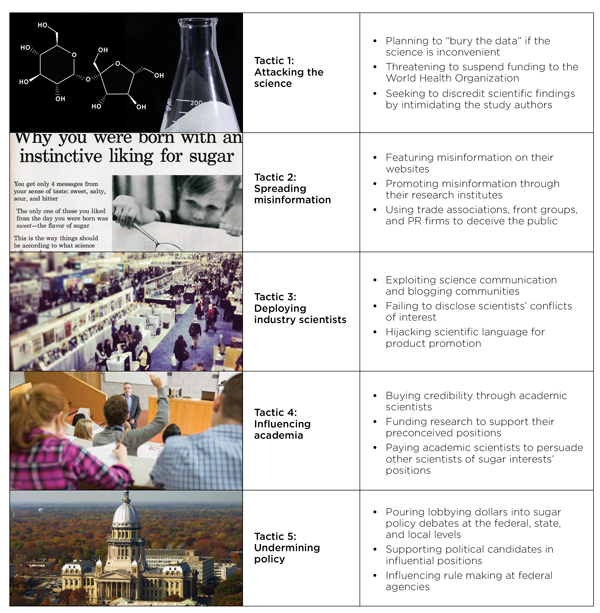“Sugar gets a bad rap.”
According to the Sugar Association, this was, apparently, the sentiment expressed by a majority of the attendees that stopped by the trade group’s booth earlier this summer at the American Association of Diabetes Educators (AADE) Annual Meeting.
If I were attending the annual meeting of the American Association for Cancer Education, the last exhibitor I’d expect to see would be the Tobacco Merchants Association! If I happened upon such a presence, I’d be a bit dumbstruck at the audacity of promoting tobacco use to cancer educators under, perhaps, the guise of harm reduction. My reaction would probably be to nod and smile politely, while backing away slowly: “Yes, indeed! Certainly, tobacco does get a bad rap.”
Sadly, the Sugar Association patting itself on the back for taunting diabetics with desserts is just the latest example of sugar interests distorting or dismissing the science on sugar’s negative health outcomes in efforts to sway public opinion and influence policy—and underwhelming at best. At worst, distributing so-called fact sheets to conference goers that claim, “The scientific evidence is clear, dietary sugars per-se pose no direct negative health impact,” citing cherry-picked reports from 25 years ago, is appallingly misleading.
But then, it’s hardly surprising to find sugar interests peddling misinformation. They’re experts at it with decades of experience.

Sugar Information Inc. was the precursor to the Sugar Association. This ad appeared in 1960. Although it contains some factual information (e.g. humans have an innate attraction to sweet tastes), It also contains misinformation (e.g. no other food satisfies your appetite so fast). The statement, “published in the interest of better nutrition,” misleads consumers about the motivation of the organization and suggests that added sugar is good for our health.
Scientific evidence supports a causal relationship between sugar and chronic metabolic diseases
As documented in our recent report Added Sugar, Subtracted Science: How Industry Obscures Science and Undermines Public Health Policy on Sugar, evidence continues to mount implicating excessive sugar consumption—whether from sugar cane, sugar beets, or corn—in numerous health problems. Sugar, in the quantities Americans are consuming it, has been associated not only with type 2 diabetes but also with cardiovascular disease, high triglycerides, and hypertension. The association of sugar with these chronic metabolic diseases is found separate from sugar’s effect on total caloric intake and exclusive of its effect on obesity.
On the basis of the latest and best available scientific information, scientific and governmental bodies, including the World Health Organization (WHO), the American Heart Association (AHA), the U.S. Department of Health and Human Services (HHS), and the U.S. Department of Agriculture (USDA) have recommended sugar intake standards far below the typical American consumption levels.
Despite the adverse health effects of sugar and the recommendations of public health experts to reduce consumption, most Americans consume much more added sugar than they should. Why is this so?
A playbook replete with tobacco-style tactics
As the Sugar Association’s appearance at last month’s diabetes conferences illustrates, sugar interests continue to obscure the science on the health effects of added sugar. As we discuss in both our report cited above and its companion Sugar-Coating Science: How the Food Industry Misleads Consumers on Sugar, sugar interests have, in fact, intentionally and actively worked for more than 40 years to suppress the scientific evidence linking sugar consumption to negative health consequences.
Sugar interests have attempted to discredit or downplay scientific evidence and have intentionally spread misinformation. They have hired their own scientists and have paid seemingly independent scientists to speak on behalf of the industry and its products. They have launched sophisticated public relations campaigns to influence public opinion.
And, yes, they have worked to influence the academic community including at scientific meetings and through the scientific literature.
To implement the tactics cited above, sugar interests spend billions of dollars annually to persuade Americans to eat and drink more sugary foods and beverages through marketing and other measures. Their actions interfere with how the public responds to scientific information about added sugar, distort our understanding of our food choices, and contribute to our continued high consumption of foods with added sugar.
Yes, indeed, sugar does get a bad rap and deservedly so—not only because excessive consumption is bad for us but also because of sugar interests’ efforts to mislead us about this simple fact.
A cynic might say the Sugar Association’s appearance at a diabetes conference is little more than another clever marketing ploy to “bury the data” by sweet-talking health educators and practitioners with deliberate deceits.

